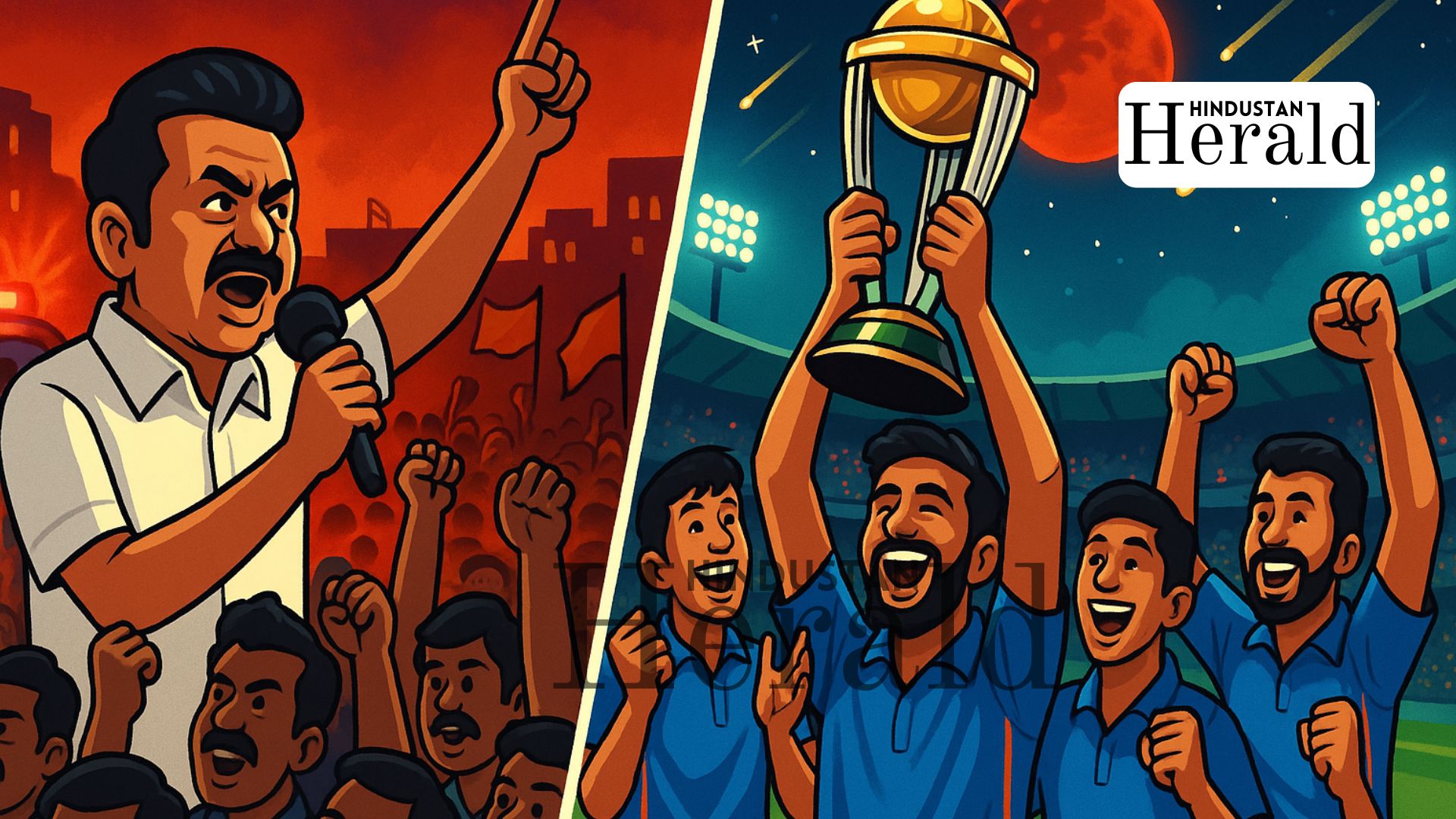New Delhi, October 1: September was messy. In one corner of India, families were burying relatives after a political rally spiraled into a crush. In another, floodwater swallowed streets just as festival lights were being strung up. There were also moments of wonder, a blood-red moon, meteors tearing the sky, and a cricket win that carried more emotion than most policies ever do. Ten stories stood out, though none in isolation capture the mood of the month.
Karur Rally Turns Fatal
The worst came from Karur, Tamil Nadu, where a TVK rally collapsed under its own weight. Too many people, too little planning, and a delayed leader’s arrival, the combination was lethal. More than 40 died. Families waited outside hospitals for updates that never came.
Police blamed the organisers. The organisers blamed “uncontrollable crowds.” The truth is simpler: crowd management is still not taken seriously in this country. We’ve seen it at temples, at stations, and now at rallies. Each time, lessons are promised, but rarely learned.
Kolkata’s Sudden Deluge
Kolkata knows monsoon rains, but on 23 September, it wasn’t rain, it was a wall of water. A cloudburst dumped so much in a few hours that the city ground to a halt. At least 12 people died, and countless others lost days of work and school.
The timing hurt. With Durga Puja days away, preparations were drowned. Processions were stranded, and pandals were waterlogged. For many, it wasn’t just a weather event; it was a cultural blow.
Gold Imports Jump
Despite prices hitting record highs, India nearly doubled its gold and silver imports compared to the previous month. Traders said it was festive buying, families said it was tradition, and economists said it was a headache.
Every surge like this makes the rupee wobble and widens the trade deficit. Yet gold remains the one thing Indian households will splurge on even in tight years. No finance minister has been able to change that.
Monsoon Above Average Again
For the second year in a row, India’s monsoon delivered more than expected. Haryana had its wettest September in three years. Farmers in rain-fed regions welcomed it, while city-dwellers groaned through flooding and power cuts.
This split reaction, rain as lifeline versus rain as disaster, says more about India’s uneven infrastructure than about the skies. In villages, water levels bring relief. In cities, they expose poor planning.
US Government Shuts Down
Far away, Washington went dark. The US government shut down after lawmakers failed to pass a budget. Roughly 750,000 workers are affected. Museums, offices, and agencies all paused until politicians compromise.
It matters here, too. Market jitters spill into India’s economy. Policy uncertainty in America affects global trade. A shutdown in Washington isn’t just their crisis; it quickly becomes ours.
Asteroid Skims Past Earth
At the end of the month, an asteroid the size of a house, 2025 SA3, shot past Earth. Scientists tracked it, reassured everyone there was no risk, and moved on.
But it caught the public imagination. People joked online, some nervously, some in awe. A reminder that in all our politics and petty fights, the planet itself spins in a universe full of close calls.
India Keeps The Asia Cup
In sport, India beat Pakistan in the Asia Cup final to clinch its ninth title. It was a five-wicket win, but those numbers don’t capture the emotion. Cricket between these two sides is less a match, more a theatre.
Fans hailed youngsters like Abhishek Sharma, while veterans quietly proved their worth again. The win lit up homes and streets in a way few other stories could.
Buckwheat Flour Scare In Delhi
Festive fasting turned into panic in Delhi when hundreds fell ill after eating dishes made from buckwheat flour. Over 200 people were hospitalised. Thankfully, no one died.
Investigators are still testing samples, but suspicions of adulteration are strong. In a country where food safety regulators are always playing catch-up, the incident wasn’t shocking. But it was a chilling reminder of what happens when demand spikes and corners are cut.
WHO Sounds Alarm On Hypertension
In quieter news, the World Health Organization said 1.4 billion people worldwide live with hypertension, and most don’t have it under control. Only one in five patients is managing it properly.
For India, the warning is urgent. Strokes, heart attacks, and kidney disease they’re already killing millions. Unlike a pandemic, hypertension creeps silently. Ignoring it only makes the numbers worse.
A Month Lit By The Skies
September closed with spectacles in the sky. First, a total lunar eclipse that painted the moon a deep red, drawing crowds onto terraces. Then, the rare Chi Cygnids meteor shower, slow and streaking, will not be seen again until 2030.
For a few nights, people stopped scrolling, stepped outside, and simply looked up. In a month marked by floods, tragedy, and warnings, that felt like a gift.
The Thread Running Through
Put together, September wasn’t one story but several colliding. A political rally that became a funeral. A city drowned just as festivals began. A surge in gold buying while the rupee struggled. At the same time, cricket lifted spirits, and the skies put on a show.
It leaves India facing familiar truths: our infrastructure is fragile, our traditions unshakeable, our health risks ignored, and our appetite for small joys still intact.
Stay ahead with Hindustan Herald — bringing you trusted news, sharp analysis, and stories that matter across Politics, Business, Technology, Sports, Entertainment, Lifestyle, and more.
Connect with us on Facebook, Instagram, X (Twitter), LinkedIn, YouTube, and join our Telegram community @hindustanherald for real-time updates.
Covers Indian politics, governance, and policy developments with over a decade of experience in political reporting.






